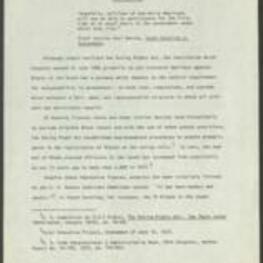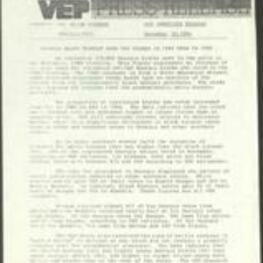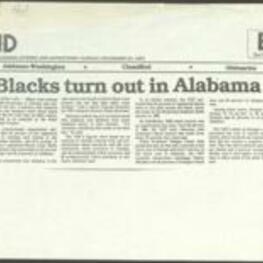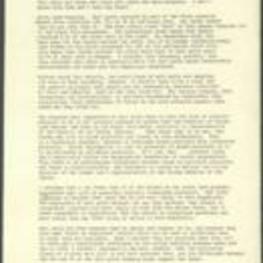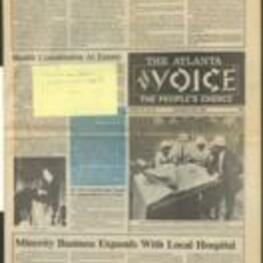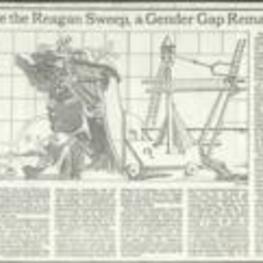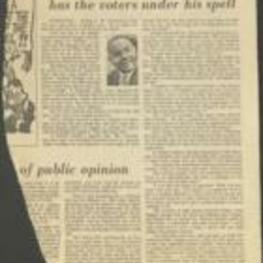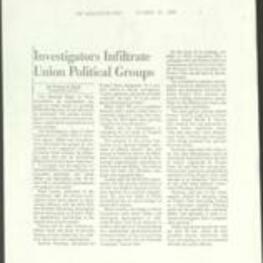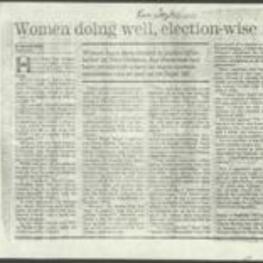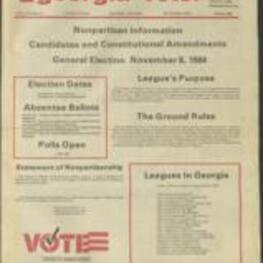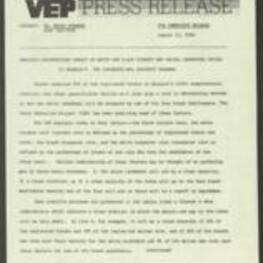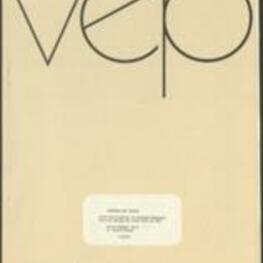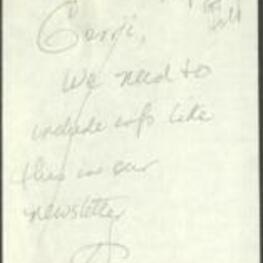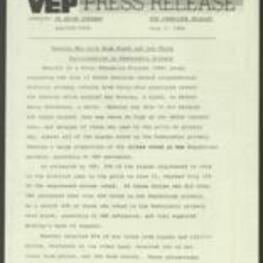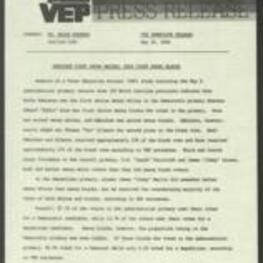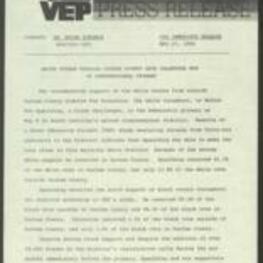1985
Flyer for the 20th anniversary of the Voting Rights Act. 1 page.
Voting, Political participation, African Americans--Politics and government, African Americans--Civil rights
Voter Education Project Organizational Records
1984/1987
A brief history of the VEP, with a plan, goals and budget for the program. 11 pages.
African Americans--Georgia--Atlanta, African American civil rights workers, Voter registration, Voting, African Americans--Civil rights, Political participation
Voter Education Project Organizational Records
1984-12-30
A Voter Education Project study based on an analysis of predominantly Black and White precincts in Georgia found that the estimated number of Black voters in the 1984 election was over 50% higher than in 1980, with a turnout rate of 64%, and that White turnout was higher than Black turnout, with 74% of registered White voters casting their votes for Reagan and 5% of Black voters doing the same. 1 page.
Groups and organizations, Political participation, Voting
Voter Education Project Organizational Records
1984-12-30
The Voter Education Project found that in the 1984 presidential election, Black voter turnout exceeded 60% in Georgia and Alabama, with Alabama being the only southern state where Black voter turnout was not less than White voter turnout, and while President Reagan won both states, he only won 5% of the Black vote in Georgia and 7% of the Black vote in Alabama. 1 page.
Groups and organizations, Political participation, Voting
Voter Education Project Organizational Records
1984-11-28
The author alerts their research findings to show more racial polarization in the November 6 election than the exit polls, and disagrees with those who claim exit polls are more accurate, citing examples of discrepancies in past elections and flaws in sampling and self-reporting, and challenges the argument that behavior in mixed precincts is different from all-Black or all-white precincts, and suggests that exit polls gain credibility through exposure but may not necessarily be accurate. 2 pages.
Voting, Political participation, African Americans--Politics and government, Race discrimination
Voter Education Project Organizational Records
1984-11-24
The results of a Voter Education Project study show that an estimated 3.3 million Black voters went to the polls in the South during the 1984 election, representing an increase of 586,000 over the previous election, with the increase due to both population growth and registration drives, and the vast majority of Black voters supported Walter Mondale. 1 page.
Groups and organizations, Political participation, Voting
Voter Education Project Organizational Records
1984-11-13
A Voter Education Project survey reported record numbers of Black voters registered in Louisiana, Mississippi, North Carolina, Georgia, South Carolina, and Tennessee, with a 16 percent increase in Georgia since 1980, but despite this increase, there are still about 500,000 unregistered Black voters in Georgia, according to Charles McCant, the assistant director of field operations for the Atlanta-based VEP. 1 page.
Groups and organizations, Voter registration, African American civil rights workers, African Americans--Civil rights
Voter Education Project Organizational Records
1984-11-13
The article discusses the gender gap in the 1984 Presidential election, which refers to the difference in voting patterns between men and women. Despite President Reagan's sweeping victory, the gender gap remained a significant feature of the political landscape, with Mr. Mondale's biggest women's majorities coming from minority groups. 1 page.
Political participation, Voting
Voter Education Project Organizational Records
1984-10-24
The article discusses the results of the debates between President Reagan and Walter F. Mondale, highlighting the fact that, despite Reagan's shortcomings in terms of working hours, knowledge of important issues, coherence, and embarrassing public utterances, he comes across as a good-natured man who is liked even better for those faults and is likely to win the election. 1 page.
Political campaigns, Political participation, Presidents
Voter Education Project Organizational Records
1984-10-19
The National Right to Work Committee is reportedly spending $100,000 this year to place approximately 100 private investigators, including many from Miller and Associates, in union political operations, voter registration organizations, and other groups, in an attempt to identify alleged violations of federal election law and misuse of funds by unions, the Mondale-Ferraro campaign, and tax-exempt organizations. 1 page.
Groups and organizations, Labor, Voter registration
Voter Education Project Organizational Records
1984-10-03
The article discusses the success of women candidates in the Sept. 29 elections in New Orleans, where women won several political positions, breaking the tradition of bias against women in politics in the city and statewide. 14 pages.
Political participation, Voting, African American women, Political campaigns
Voter Education Project Organizational Records
1984-10
The League of Women Voters of Georgia, a nonpartisan organization providing election information through its voter service program presents this guide to candidates and Constitutional Amendments for the November 6, 1984 General Election. 4 pages.
Voter registration, Voting, Suffrage, Groups and organizations
Voter Education Project Organizational Records
1984-08-28
Press release from the Voter Education Project regarding a study by the Voter Education Project (VEP), which found that Southern congressional representatives were not responsive to Black concerns. The study found that the average Southern representative received a low rating on a Black Concerns Scale, and that there was considerable variation among the states in their degree of responsiveness. The study also found that Republican representatives were much more nonresponsive to Black concerns than Democratic representatives. 2 pages.
Political participation, African Americans--Civil rights, Voter registration, African Americans--Politics and government
Voter Education Project Organizational Records
1984-08-13
Press release from the Voter Education Project regarding analysis of four factors that could determine whether the white incumbent in Georgia's Fifth Congressional District would be unseated by one of his four Black challengers. The factors were the Black turnout rate, the white turnout rate, the black crossover rate, and the white crossover rate. The VEP analysis showed that a close election was possible, but a clear win for the incumbent or one of the Black challengers was also possible. 3 pages.
Political participation, African Americans--Civil rights, Voter registration, African Americans--Politics and government, Demographic surveys
Voter Education Project Organizational Records
1984-07-25
VEP research department essay by Brian Sherman, Ph.D. and K. Farouk Brimah on the increase of participation in voting by the Black population in the South, listing states and percentages. 16 pages.
African Americans--Georgia--Atlanta, African American civil rights workers, Voter registration, Voting, African Americans--Civil rights, Political participation
Voter Education Project Organizational Records
1984-07-15
"More Blacks are turning to the politics of frustration", "Federal workers await voter registration rule", and "Rev. Jesse Jackson and his "tribal politics". 6 pages.
African Americans--Politics and government, Voter registration, Race discrimination, Political participation
Voter Education Project Organizational Records
1984-07-02
Press release from the Voter Education Project regarding a study by the Voter Education Project, which found that Ken Moseley, a Black, won the South Carolina second congressional district primary because of a higher Black turnout rate and a higher Black crossover vote. Moseley received 87% of his votes from Blacks and 13% from whites, while Stevenson received 64% of her votes from whites and 36% from Blacks. The results from the Second Congressional District followed trends observed elsewhere in the south in the 1984 primaries, where Blacks were participating in Democratic primaries at a much higher rate than whites and were having a significant impact on the selection of the party's candidates. 2 pages.
Political participation, African Americans--Civil rights, Voter registration, African Americans--Politics and government, Demographic surveys
Voter Education Project Organizational Records
1984-05-29
Jesse Jackson criticized the United States' "arrogance" in Central America during his second major foreign trip of his Democratic presidential campaign, finding support among Mexican government officials for his condemnation of President Reagan's Central American policies and peace plan, which emphasizes negotiation and dialogue rather than force and monologue, and calls for ending military aid to El Salvador, normalizing relations with Cuba, ending support for anti-Sandinista rebels in Nicaragua, and ending U.S. military involvement or assistance in Guatemala, Honduras, and Costa Rica. 1 page.
African Americans--Politics and government, International relations, Political campaigns
Voter Education Project Organizational Records
1984-05-29
Press release from the Voter Education Project regarding a study of the May 8 gubernatorial primary in North Carolina, which found that Rufus Edmisten was the first choice among white voters, while Edward "Eddie" Knox was the first choice among Black voters. Knox was also second among white voters, while Edmisten was second among Black voters. 1 page.
Political participation, African Americans--Civil rights, Voter registration, African Americans--Politics and government, Demographic surveys
Voter Education Project Organizational Records
1984-05-27
Press release from the Voter Education Project regarding a study by the Voter Education Project, which found that Ken Spaulding, a Black challenger, lost the Democratic primary in North Carolina's second congressional district to Tim Valentine, the white incumbent. Spaulding received strong support from Black voters, but he was not able to win over enough white voters outside of Durham County. Valentine received 31.8% of the white vote, which was enough to secure his victory. 2 pages.
Political participation, African Americans--Civil rights, Voter registration, African Americans--Politics and government, Demographic surveys
Voter Education Project Organizational Records



